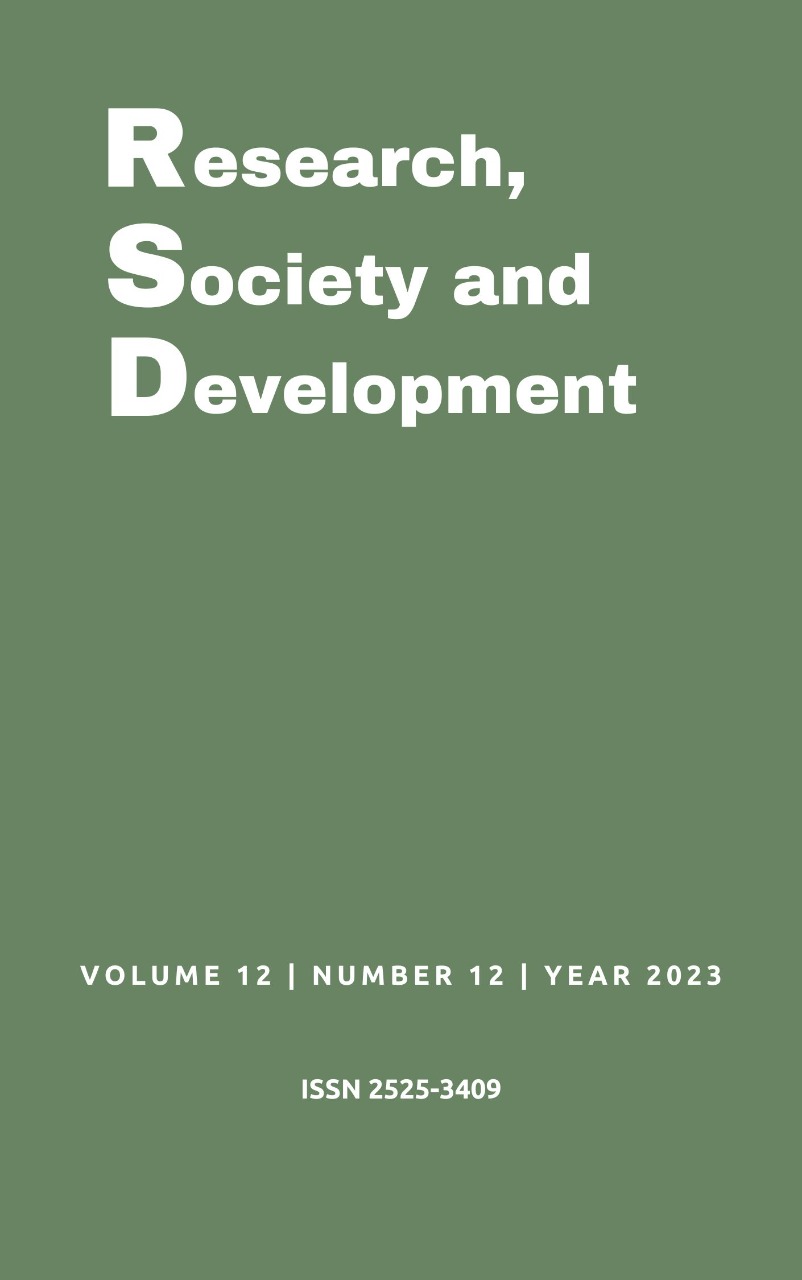O uso da tecnologia na educação
DOI:
https://doi.org/10.33448/rsd-v12i12.43902Palavras-chave:
Ensino, Escola, Tecnologia, Transformações, Sociedade.Resumo
O objetivo deste estudo é descrever o papel da tecnologia dentro da Educação, traçando pontos positivos e negativos de seu uso nas escolas. A presente investigação se caracteriza como uma pesquisa bibliográfica, de caráter qualitativo, bem como se classifica como uma pesquisa básica e exploratória. Para a coleta de dados utilizou-se a plataforma de busca “Google Acadêmico”, com uso dos descritores “Tecnologias and Educação”. O objetivo não foi fazer um estado atual do conhecimento, mas encontrar trabalhos que discutiam a temática Tecnologia e Educação, para que a partir das visões de diferentes autores haver um debate sobre a temática. A delimitação das buscas foi de 2016 a 2023. A análise dos resultados aconteceu por meio da exclusão, separação e interpretação dos achados. Entre os principais resultados obtidos pode-se dizer que a tecnologia existe desde o princípio da humanidade, mas devido às transformações que o mundo já passou hoje ela cresce e evolui aceleradamente, fazendo parte do cotidiano das pessoas e presente nos mais diferentes e variados setores de trabalho, comércio, indústrias, lazer, estudos, etc. Viu-se que é necessário seu uso na educação, pois ela faz parte do cotidiano dos alunos, mas para que seu uso seja efetivo e possa proporcionar aprendizagens significativas os professores precisam ter uma boa formação. Alguns pontos positivos encontrados é que a tecnologia pode favorecer o aprendizado do aluno se for usado como meio, ela também pode motivar os jovens e diminuir tempos e espaços, entre um de seus pontos negativos é que em muitos casos ela pode servir como uma distração.
Referências
Alves, E. F. P. (2022). Tecnologia na educação: reflexão para uma prática docente. Brazilian Journal of Development, 8(1), 4227-4238, 2022.
Azevedo, A. L. P. F. (2022). Usos da tecnologia na educação: uma revisão bibliográfica. REUNINA – A Revista de Educação da Faculdade Unina, 3(1), 89-107.
Beland, L. – P. & Murphy, R. (2015). III Communication: technology, distraction & student performance. London. Centre for Economic Performance/London School of Economics and Political Science, 2015. (CEP Discussion Paper, 1350). https://cep.lse.ac.uk/pubs/download/dp1350.pdf.
Bittencourt, P. A. S. & Albino, J. P. (2017). O uso das tecnologiasdigitaisna educação do século XXI. RIAEE–Revista Ibero-Americana de Estudos em Educação, 12(1), 205-214.
Costa, A. B. S. et al. (2023). The use of educational technologies in sexual health education with adolescents. Research, Society and Development, 12(2), e29812240300. https://doi.org/10.33448/rsd-v12i2.40300.
Dantas, D. M. P., Cristovam, F. K. G., Araújo, M. J., Brandão, I. A., Santana, A. M. S., & Pê, S. Z. (2020). The dispatch of the classroom and Digital Technologies. Research, Society and Development, 9(11), e79691110416. https://doi.org/10.33448/rsd-v9i11.10416.
Ferigato, E.; Santos, O. S.; Souza, S. M. N. L.; Lima, D. L.; Messias, J. F. & Estender, A. C. (2023). The use of smartphones in schools: Benefits, challenges and educational perspectives. Research, Society and Development, 12(8), e19412843125. https://doi.org/10.33448/rsd-v12i8.43125.
Guenaga, M. et al. (2012). A tool to evaluate the level of inclusion of digital learning objects. Procedia Computer Science, 14, 148-154.
Gil, A. C. (2022). Como elaborar projetos de pesquisa. Atlas.
Kenski, V. M. (2012). Educação e tecnologias: o novo ritmo da informação. Editora Papirus.
Kobs, F. F. & Junior, E. F. C. (2016). O papel das tecnologias digitais na educação: perspectivas para além dos muros da escola. Rev. Cienc. Educ., Americana, 34, 41-73.
Kraemer, K. Z. M. et al (2016). Tecnologias digitais na educação básica: desafios e possiblidades. Revista Novas Tecnologias Na Educação, 14(2). https://doi.org/10.22456/1679-1916.70692
Lakatos, E. M. & Marconi, M. A. (2003). Fundamentos de Metodologia Científica. Atlas.
Limeira, G. N., Batista, M. E. P., & Bezerra, J. de S. (2020). Challenges of using the new technologies in higher education in front of the COVID-19 pandemic. Research, Society and Development, 9(10), e2219108415. https://doi.org/10.33448/rsd-v9i10.8415.
Martins, S. P. et al. (2023). O lugar das tecnologias na Educação Básica: um estado do conhecimento dos anais do EDUCERE (2008-2019). Boletim de Conjuntura (Boca), 15(43), 562-578.
Minayo, M. C. S. (2014). O desafio do conhecimento, pesquisa qualitativa em saúde. (14a ed.), Hucitec.
Oliveira, L. R. (2017). Da inovação pedagógica e do papel da tecnologia na educação: algumas considerações possíveis no quadro do Projeto Gilgamesh. Revista Tempos e Espaços em Educação 10(23), 49-60.
Pereira, N. V., & Araújo, M. S. T. de. (2020). Use of technological resources in Education: paths and perspectives. Research, Society and Development, 9(8), e447985421. https://doi.org/10.33448/rsd-v9i8.5421.
Pompeo, C. (2014). Professores disputam atenção de alunos com redes sociais. Gazeta do Povo, Londrina, 24 maio de 2014. https://www.gazetadopovo.com.br/vida-e-cidadania/professores-disputam-atencao-de-alunos-com-redes-sociais-8i7ugq1uxkjhagjbhy7hgl5ji/.
Prodanov, C. C. & Freitas, E. C. (2013). Metodologia do trabalho científico: Métodos e Técnicas da Pesquisa e do Trabalho Acadêmico. (2a ed.), Feevale.
Downloads
Publicado
Edição
Seção
Licença
Copyright (c) 2023 Mayara Rossi; Anne Karoliny de Souza Melo Vilela; Clésio Cássio Almeida Costa; Gleziane Soares Viana; Janaína Patricia de Souza e Silva; Juliana Aparecida Reis Marcelino; Maria Aparecida Nunes de Souza; Natanielly de Paula Freitas; Queli Cristina Rezende; Valquiria Machado de Oliveira

Este trabalho está licenciado sob uma licença Creative Commons Attribution 4.0 International License.
Autores que publicam nesta revista concordam com os seguintes termos:
1) Autores mantém os direitos autorais e concedem à revista o direito de primeira publicação, com o trabalho simultaneamente licenciado sob a Licença Creative Commons Attribution que permite o compartilhamento do trabalho com reconhecimento da autoria e publicação inicial nesta revista.
2) Autores têm autorização para assumir contratos adicionais separadamente, para distribuição não-exclusiva da versão do trabalho publicada nesta revista (ex.: publicar em repositório institucional ou como capítulo de livro), com reconhecimento de autoria e publicação inicial nesta revista.
3) Autores têm permissão e são estimulados a publicar e distribuir seu trabalho online (ex.: em repositórios institucionais ou na sua página pessoal) a qualquer ponto antes ou durante o processo editorial, já que isso pode gerar alterações produtivas, bem como aumentar o impacto e a citação do trabalho publicado.


